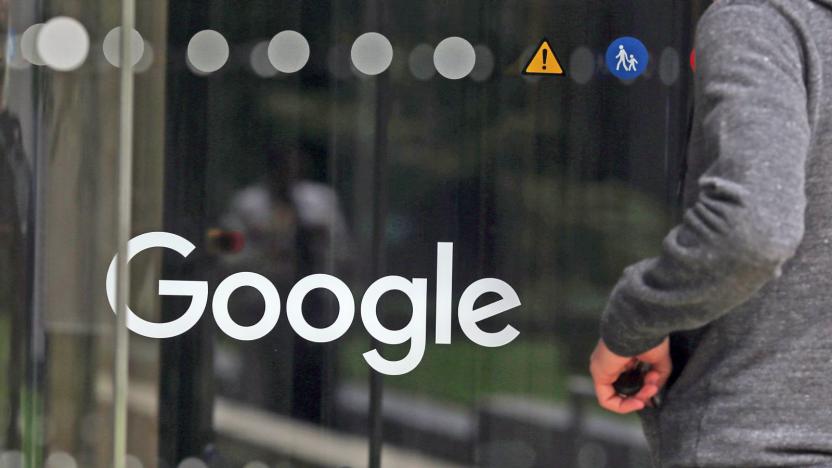quality
Latest

Twitter will no longer destroy the quality of uploaded JPEGs
Twitter is making some changes to the way it processes image uploads, and photographers on the platform are delighted. According to Twitter engineer Nolan O'Brien, JPEG encoding will now be preserved in images uploaded to Twitter via the web. Previously, images were transcoded, which meant lower quality pictures, much to the rightful annoyance of talented creators.

FandangoNow streams IMAX Enhanced 'Spider-Man' on Sony 4K TVs
We heard back in January that streaming platform FandangoNow was going to get some IMAX Enhanced content -- now it's arrived. Just a week after the streaming service made its catalog available on Oculus Go and Quest headsets, it's continuing its push to get crystal-clear movies right in your face with the launch of IMAX Enhanced on select Sony 4K Android TVs in the US.

Google explains how it's fighting fake news
Like all online platforms, Google is not immune to the scourge of fake news that has dominated headlines over the last few years. The company has taken various steps in fighting the problem -- from partnering with fact-checking networks to launching the $300 million Google News Initiative. Now it's expanded its transparency efforts further by detailing at length the steps it takes to fight disinformation across its services.

Netflix alliance helps filmmakers meet its stringent video demands
Netflix doesn't care whether its content comes from small producers or large studios, but cash-strapped filmmakers might blanche at its strict video quality requirements. To make it easier to figure out what to buy or rent, Netflix has launched the Post Technology Alliance. It's partnered with camera, editing, color correction and encoding companies to show producers exactly what equipment they'll need to create Netflix shows from start to finish.

Samsung's ISOCELL Plus camera sensor upgrades low light performance
While Samsung may be playing catch up in some fields, it continues to charge ahead with its smartphone camera tech. Today it's unveiled its new ISOCELL Plus technology, which means sharper and more accurate photos even in challenging light environments.

Google's AI gets human help to avoid offensive search results
Google is making a new push to eliminate offensive search results such as those that appeared from US neo-Nazi site Stormfront in response to queries about the Holocaust. As Search Engine Land noticed, the site has revised its guide on how to assess search result quality for around 10,000 of its "quality rater" contractors. That includes a new "upsetting-offensive" content flag for the promotion of violence or hate against minorities and other groups, racial content, graphic violence and human trafficking.

Neil Young says his music is too good for streaming services
Neil Young's been touting the merits of high-resolution audio for some time now, and he's had enough of streaming services' quality. The singer is pulling his music from those subscription-based libraries, a move fellow artist Prince made just days ago (Prince's tunes are still available on Tidal, of course). "I don't feel right allowing this to be sold to my fans," Young said. If you really need your fix of "My My, Hey Hey," he'd probably suggest you try Pono. He may rethink the decision when and if sound quality improves, but for now, he'd rather his music not be compromised by "the worst quality in the history of broadcasting or any other form of distribution." I wonder what his thoughts are on Tidal's lossless tier. [Image credit: Photo by Tommaso Boddi/WireImage]

A Mild-Mannered Reporter: What's the problem with Marvel Heroes?
Marvel Heroes is going to release soon. Maybe. Probably? It's hard to say. We have a release window for the game but not a large amount of evidence that the game is actually moving toward that release window; there are beta updates but no clear signs that the game's open beta will be coming soon. That's a bit duplicitous for people already asked to purchase the game's high-end item packs, but that's a strategy employed by more than a couple of games now, so I'm not going to be too harsh about that. Or maybe I am, seeing as how the game is asking you to spend a lot of money sight unseen when it has some pretty stiff competition out already. I'm increasingly of the mind that Marvel Heroes is taking a hard sell and making it endlessly harder by launching into the teeth of other games without a solid strategy. Worse yet, it might be far too late for the game to change anything for the better in a significant fashion.

Apple wins patent rights to new curved glass process
Apple has been granted patent rights for a new process using high temperatures to shape and mold a curved glass casing, similar to the one currently on newer Samsung devcies, as opposed to the very flat screen found on the iPhone 5. This exact patent doesn't have a huge influence on Apple's actual production line, and definitely doesn't portend anything as interesting as a new iPhone design. But it does show that Apple has been researching how to make this kind of curved glass for a long time, and that the company's very interested in finding more and easier ways to make its world-famous device components. The process also covers glass of all shapes and sizes, so while the images included with the patent (as seen above) hint that it would be used to make new iPhones and other portable devices, the documents also say that the glass could be shaped for larger devices, including "displays, monitors and televisions." Apple's work on processes like this is an investment not just in determining how to create today's devices, but a look ahead to what it might create in the future as well.

Ford wants you to meet its touchy, feely interior quality robot, RUTH 2.0
That's RUTH. In the end, she really amounts to a big robot arm with six joints, but Ford clearly has a soft spot for the faceless employee. First utilized in Europe, the Robotized Unit for Tactility and Haptics is currently at work helping to tweak the interiors of the company's 2013 Fusions, turning data collected from customers across the world into the hard to define concept of "quality," touching the trim, pushing buttons and turning knobs in the interior of the vehicle, in order to help provide what Ford says is, "the same type of quality they might feel if they were to buy a high-end luxury car." The version of the arm dubbed Ruth 2.0 is currently being used by Ford alone in North America, and the company has extended her quality checking to include seat comfort in the vehicles. Check out a video of the long arm of the car company after the break.

Earthrise killing subscriptions, going free-to-play in 2012
The struggling sci-fi sandbox Earthrise is no longer interested in competing in the subscription market, and is instead veering toward a free-to-play model in 2012. As of December 1st, all players will be able to experience the game without a monthly charge as Masthead Studios prepares for a F2P version. Masthead CEO Atanas Atanasov says that the move is an effort to retain customer trust while the developers shore up the game's weaknesses: "We decided to let all our players unlimited gaming experience until we all are satisfied with the experience in our game. At the moment Earthrise features one of the best visuals, content, and gameplay of all sci-fi MMOs on the market. However, it is missing polish and has annoyances that spoil the fun in the game. We are learning from our experience and that is why we will remove monthly charges until we bring the game to a quality state that is satisfactory to us and our players." Once the title is brought up to par, Masthead will transition it to a true F2P model, although Atanasov assures players that it will not incorporate pay-to-win purchases. Until Earthrise goes F2P, new accounts will be invitation-only as Masthead restricts the number of incoming players. All current subscribers will be able to invite a few of their friends during the transition, however. [Source: Masthead Studios press release]

Motorola's Jha blames apps for poor battery life, says Blur can save the day
Motorola Mobility CEO Sanjay Jha took time yesterday to talk business strategy, the advantages of Android, and to take developers to task for poorly optimized apps. At several points during the 50-minute chat the topic turned to lackluster battery life, and Jha placed blame squarely at the feet of hastily tested apps -- which he said can sap between 30 and 40 percent of your phone's juice. The chairman even suggested their effect on longevity and performance were the impetus behind 70 percent of handset returns. But, the company has a solution, and (surprisingly) its name is Blur. In a moment of presumably unintentional creepiness Dr. Jha said, "MotoBlur allows us to know, with precision, what battery life you're seeing," before suggesting that future phones could warn you about power draining apps and bandwidth hogs. What wasn't clear though, was if he was talking about the existing Android battery manager or if Motorola has been collecting usage data -- since we never opted-in to such a program, we're really hoping it's the former. Hit up the source link for the entire conversation, you'll find the relevant bits at the 4- and 25-minute marks.

Ask Massively: The next internet fad will be tires edition
Tires are round bits of rubber that are placed upon the wheels of vehicles in order to facilitate spinning or something. Also, sometimes your parents might string some rope around one because they're too cheap and lazy to buy you a decent swingset. Anyhow, the next thing on the internet will be tires. I'm calling it right now. Don't look at me like that. We're talking about the same people who made Rebecca Black and Happy Cat famous. Just... tires. Rolling or... whatever. It's time for Ask Massively this week, as you could probably tell from the introduction about half a step away from a schizophrenic rant. This week, we've got a question about scaling instance difficulty and a couple of questions from our forums, none of which has anything to do with tires. If you'd like to ask a tire-related question, leave one in the comments or mail it along to ask@massively.com. I guess I can answer MMO questions, too.

Pioneer debuts new Sound Wing HVT speakers, novel tech touted within
There's a ton of gadgetry that goes into speakers, but the notable thing here is that the Pioneer folks have begun using HVT, or Horizontal-Vertical Transforming technology -- but more on that in sec. This beauty is engineered to reduce unwanted vibration and preserve bass caliber while outputting 100W of sound. Featuring a double diaphragm packaged close together, the Sound Wing gives off omnidirectional sound -- that's 360 degrees of noise. And thanks to HVT, the coils within the speaker have been rearranged to reduce the wasted space in traditional speakers -- though for some reason this particular unit still measures a portly 109mm thick. Seeing that the tech Pioneer has implemented here is novel, we're interested to see how this thing will sound in the real world. You'll find the Sound Wing in Japan for ¥41,000 (about $507) come June.

Google buys Green Parrot Pictures, looking to make YouTube vids easier on the eye
If you can't fix it, buy someone who can. That must be Google's rationale behind this latest acquisition, as the proprietor of YouTube has just bought Green Parrot Pictures, a company concerned solely with enhancing and improving the quality of video content. Through the use of some fancy motion prediction algorithms, the Irish startup has been able to build a name for itself over the past few years, and now it's been snapped up by the biggest fish in the online video ocean. The removal of flicker, noise and blotches from poorly executed recordings sounds nice, but we're most excited by Green Parrot's video stabilization feature. With all the cameraphone video being uploaded nowadays, there's plenty of camera shake populating YouTube's archives, and the addition of such a potent post-production technique seems like a veritable boon to us. Check out video demos of the stabilization algorithm and Green Parrot's other technologies below.

WebOS will be on 'every HP PC' shipping next year, says CEO
You'd think Leo Apotheker, HP's newest CEO, would want to save a bit of thunder for his March 14th event. Instead, the man continues to unleash stentorian quotes with unabashed candor like today's claim that "HP has lost its soul." He's also making bold proclamations about every HP PC being able to run WebOS and MIcrosoft Windows as an integrated experience in 2012 -- a move the company hopes will create a "massive platform" to attract those all important developers. Apotheker's strategy will reverse Mark Hurd's cost-cutting emphasis with a renewed focus on product quality and innovation -- the latter achieved by breaking down inter-company barriers that currently separate product groups and by boosting the R&D budget already pegged at $2.96 billion last year (a pittance by some measurements). Click the source link below to read the Businessweek article in full if you're interested in Leo's issue with being the smartest person in the room and his attempts at Californication. Cool? Awesome.

J.D. Power: Verizon has best call quality nationwide, T-Mobile consistently below average
J.D. Power, that well known arbiter of human opinion in the United States, has just released its latest study on customer satisfaction with wireless carriers. It addresses such things as (the lack of) dropped calls, failures to connect, voice distortion, echoes, static, and late-arriving text messages, and ultimately churns out a rating out of five stars relative to the regional average and other carriers. In testing done between July and December last year, Verizon had the best or tied for the best satisfaction ratings in five of the six studied areas, while AT&T and Sprint traded blows for second and T-Mobile had to admit defeat as the laggard of the top four. US Cellular managed to score highest in the North Central region, but J.D. Power's overall assessment isn't very rosy for any of the carriers -- the stats collector says growing smartphone usage, heavy texting and more indoor calls are collectively causing call quality to stagnate, and even warns that "increased adoption of smartphones and wireless tablets may continue to compromise the quality of network service."

Apple and other music retailers purportedly looking at 24-bit, high-fidelity audio downloads
Digital downloads, at least pertaining to music, have come a long, long way. The iTunes Music Store in particular has surpassed Walmart as America's leading seller of music, and it's evolved from a DRM-laden mess to a restriction-free(ish) marketplace with higher-than-average bitrate support. But it seems that 256kbps simply isn't high enough. According to unnamed "executives involved in talks," Apple -- as well as a few other digital music retailers -- are currently in discussions with labels to "improve the quality of the song files they sell." Essentially, these retailers are hoping to hawk 24-bit audio rather than the compressed 16-bit files available today, possibly with a price premium attached. The real trick, however, won't be coercing the labels to cooperate, but to retool future devices to actually play back 24-bit files. iTunes itself is already capable of handling 'em, but the iPod, iPhone and a slew of other handheld devices aren't. The report doesn't mention how close to a deal anyone is, but we're guessing it'll be sooner rather than later. Here's hoping the iPhone 5 ships with 128GB of capacity -- we're going to need an awful lot of space to handle those lossless Police albums.

Apple, others in talks to improve quality of music downloads
CNN reports that Apple is in touch with record labels to try and improve the quality of the downloadable music it sells on iTunes and elsewhere. Currently, the MP3s sold on iTunes are formatted as 16-bit files, but under the new proposal, they'd be upgraded to 24-bit files, which means the files would have more audio data included, and thus be able to play out at a higher resolution. As Chris Foresman at Ars argues, however, it may not matter. While higher quality is always nice to have (and there's no reason Apple shouldn't have it, unless the audio needs to be compressed further for streaming or other memory concerns), most people won't hear the full resolution anyway. You can have the highest quality audio files you want, but when you're playing them through a set of cheap speakers (or even the MacBook's default built-in speakers), you're not going to hear all of the highs and lows that you should. Still, it will be nice to have the higher resolution, and it'll give Apple and iTunes yet another selling point if the agreement can be made (not to mention sell a lot of higher-quality audio speakers and other products as well). So, I expect we'll see it happen before long. Remember way back in 2007 when Apple raised the encoding rate to 256 Kb/s? [via Electronista]

The Daily Grind: What do you consider "good" player-created content?
Star Trek Online might be the most recent game to prepare for the player-created content bandwagon, but it's far from the only one. Yet every time tools are released to allow players to make their mark, the same complaint arises -- there's no easy way to sort the good content easily from the bad. Which is a fair complaint, until you stop to realize that there's not really a good definition available of what would qualify as good content. After all, when you let players make anything, one man's trash will be another man's treasure. Some people like content that optimizes rewards, making the most efficient use possible of time for leveling a character toward the cap. Others prefer a well-crafted story, with no real consideration for whether or not the content is rewarding. And still others prefer a challenge, something harder than the official content, a chance to really see what players can accomplish when pushed to the limit. Whether it's in City of Heroes or Ryzom, what do you look for out of player-generated content? What do you think of as good content and what do you think of as bad? Every morning, the Massively bloggers probe the minds of their readers with deep, thought-provoking questions about that most serious of topics: massively online gaming. We crave your opinions, so grab your caffeinated beverage of choice and chime in on today's Daily Grind!







